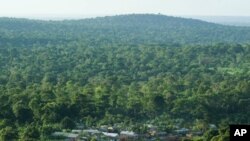Wealthy investors in Uganda are taking advantage of a new money-making opportunity investing in trees. Trees have become an attractive investment because of the rising cost of timber and the allure of carbon credits. The Ugandan government sees these so-called "tree banks" as a means to combat deforestation. But practice remains controversial.
These days, Uganda’s wealthy elite are less likely to put their money into property, the stock market, or even the bank. The new hot investment opportunity is trees. Vast plantations of pine and eucalyptus are sprouting across the country, planted by those looking to cash in on valuable wood and possibly carbon credits.
Trees as business
Businessmen Peter Nyeko has invested $50,000, along with two partners, in 20 hectares of eucalyptus trees just west of the capital, Kampala. He calls it his “tree bank.” Despite the work involved in clearing the land and caring for the trees, he says a tree bank is the best investment he could possibly have made.
"You could invest about $50,000 and in about 10 years you’re harvesting trees worth about $5 million," he said. "You buy a seedling for less than $5, but once that seedling grows to become a fully grown tree, it will probably cost more than $150. As long as you’re willing to wait for about 10 years for a return on your capital employed, it’s pretty amazing. It’s just like a trust fund."
This is exactly the message the Ugandan government is trying to convey to its citizens. Demand for wood is on the rise, and the deforestation rate is alarming - the country has lost nearly 40 percent of its forests over the past 20 years.
Gonza Araali of the National Forestry Authority, or NFA, says his agency provides free seedlings and technical advice to tree planters. He says the government is advocating tree planting not just for the wealthy, but for all segments of Ugandan society.
"We are also telling them it’s an investment; it’s an insurance," he said. "It’s where they can get income and be able to sustain themselves, and also pay school fees for their children."
Possible carbon credits
Systems are not yet in place in Uganda to allow tree planters to benefit from carbon credits. But investors like Nyeko are betting that they soon will be.
"In the next few years, we might finally be able to trade carbon credits linked to trees that have been growing. That would open up another revenue stream as well, making it sometimes even more profitable to keep the trees rather than cutting them. It’s part of my rationale," said Nyeko.
Not everyone is convinced that tree banks are beneficial for Uganda as a whole. The most popular trees to plant are fast-growing varieties like eucalyptus and pine - imported trees that threaten native species.
On the other hand, Araali of the NFA explains that fast-growing trees can also protect native forests.
"People are able to get timber out of them, and the rate at which they would have gone to the natural forest to cut [trees] reduces," he said. "They also help in conservation in one way or another, which people are not seeing."
Environmental concerns
But as Abby Onencan of the Entebbe-based Nile Basin Discourse points out, there are other environmental concerns as well, some of which could have regional implications.
"A lot has been said about the eucalyptus. There are some breeds which are really bad, they really cause a lot of destruction and should not be planted near the water," said Onencan. "If we plant trees around the Nile that take up the water, then the water might never reach Egypt. What one country does affects largely another country, so we need to be really careful about what we do."
Social consequences
Some say the tree plantations also come with a social cost. Last year the British NGO Oxfam published a report accusing a British-based tree planting company of kicking local people off land in Uganda in order to plant. The company later closed their operations in the country on a wave of bad publicity.
Uganda’s Minister for the Environment, Flavia Munaaba, admits that allocating large tracts of land to tree plantations can create problems.
"We are losing forest cover very rapidly. However, when it comes to guidance on reforestation, the tendency is to allocate land to big investors, at the exclusion of the common people. That is the problem, in the sense that there is resentment," said Munaaba.
Responsible planting
But Onencan says there are ways in which the trees, if sensitively managed, can benefit the local population.
"I think you can actually empower the communities to be part of the whole program in such a way that they are the ones planting the trees, they are the ones determining the tree that they want to plant, and they get actually a percentage of the benefit. So you involve them fully so they can own that project," he said.
Nyeko is convinced that by the time he eventually harvests his trees, they will have benefited both the environment and Ugandan society. His eucalyptus will be useful, he says, to a growing population hungry for timber.
"The more people that get involved now, the better, because the population is rising, demand is shooting up, and we just don’t have enough timber growing to sustain our demand for timber. There is a benefit in it for the whole country at large," he said.
In any case, the NFA reports that more and more people are asking for planting advice, so tree banking will most likely become even more popular in the years to come.




